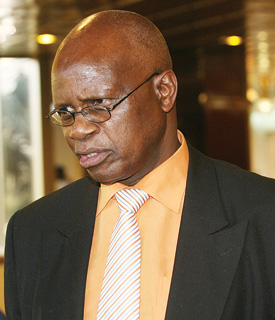
The Ministry of Finance restored its role as the engine of the economy following the adoption of the multi-currency regime in 2009.
Bernard Mpofu/ Ndamu Sandu
Before this, the Reserve Bank of Zimbabwe had assumed an ultra-ministerial role, directing economic policy at the height of the decade-long economic contraction.
Ordinarily, anyone in charge of this key government portfolio would face scrutiny.
So important is Treasury to Zimbabwe’s politics that Zanu PF credits then acting Finance minister Patrick Chinamasa for introducing dollarisation to stem inflation, notwithstanding the bad policies that had triggered this unprecedented economic meltdown.
Outgoing Finance minister Tendai Biti, though credited with several reforms, is one minister who bore the brunt of Zimbabwe’s underperforming economy.
During his tenure, his offices were besieged by war veterans who were baying for his blood.
Farmer organisations threw aspersions at him for underfunding the former mainstay of the economy — agriculture. Following Zanu PF’s election victory, this week NewsDay Business looks at some possible frontrunners for the Finance ministry.
- Chamisa under fire over US$120K donation
- Mavhunga puts DeMbare into Chibuku quarterfinals
- Pension funds bet on Cabora Bassa oilfields
- Councils defy govt fire tender directive
Keep Reading
President Robert Mugabe, winner of last Wednesday’s elections, has the prerogative to appoint five ex-officio Members of Parliament, meaning that he can cast the net wider.
Patrick Chinamasa As acting Finance minister, Chinamasa introduced the multicurrency system in 2009 in response to refusal by Zimbabweans to accept the local currency.
Herbert Murerwa Murerwa won’t be new to Treasury, having been minister on two occasions. He is a Mugabe loyalist. A former diplomat, Murerwa is seen as a moderate politician who will pursue dovish policies.
Murerwa holds a Doctor of Education degree in Educational Planning (Harvard University, US), Master of Education Degree in Educational Planning (Harvard University, US), Bachelor of Arts (Sociology) degree from George William College (US).
Mugabe has in the past accused Murerwa of practicing bookish economics at the Finance ministry after the minister had called for an end to quasi-fiscal activities blamed for fuelling hyperinflation.
“They have this word they like using; quasi, quasi. But I tell them that this is the expenditure that we need. We are under sanctions, and there is no room for the type of bookish economics we have at the Ministry of Finance,” Mugabe said.
Some months later, Murerwa was axed in a mini Cabinet reshuffle in which he was the only one to lose a ministerial post.
He bounced back into government as Lands and Rural Resettlement minister.
During the past government, Murerwa had been largely conspicuous by his absence due to health concerns.
Since the President has the prerogative to appoint ministers, Mugabe may choose to appoint renowned bankers.










